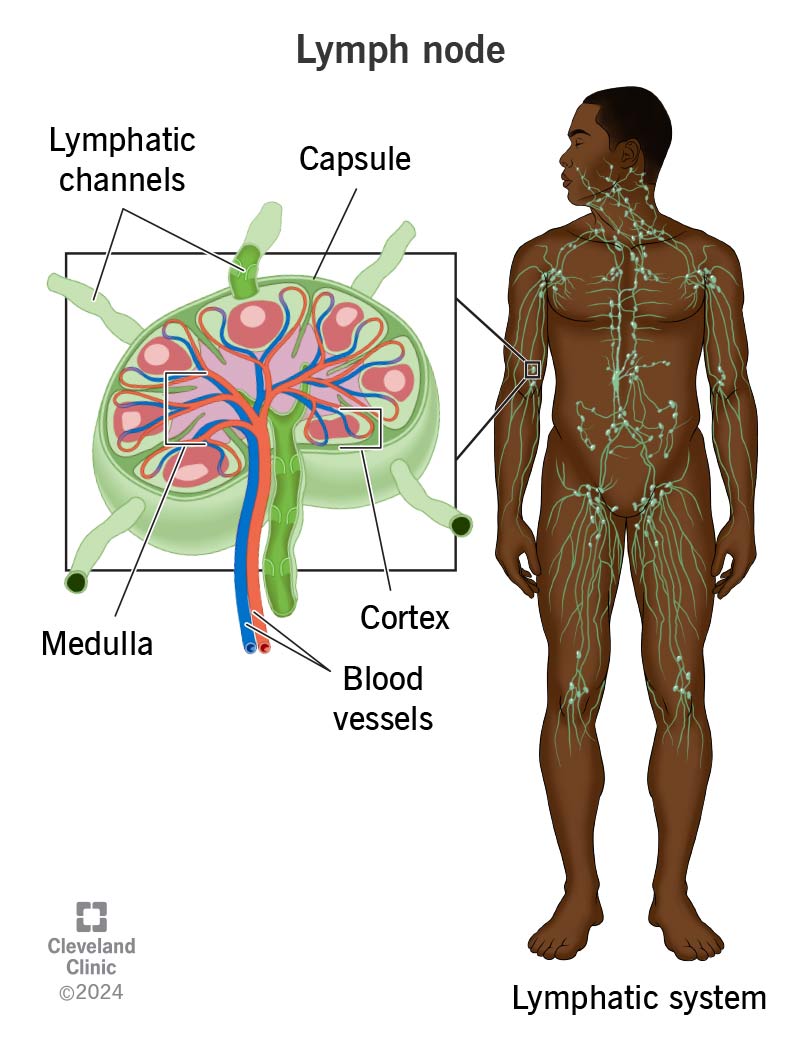Lymph nodes are bean-shaped areas of tissue that filter fluid in your body (lymph) for harmful substances or cells. Immune cells in lymph nodes remove germs, damaged cells and cancer cells. Lymph moves from lymph vessels to lymph nodes for filtering before the fluid goes back into your blood.

You have lymph nodes all over your body V体育官网入口. There are lymph node clusters located:.
There are no lymph nodes in your brain or spinal cord.
Lymph nodes are shaped like beans or ovals V体育2025版. Each lymph node has several layers:.
Immune cells — like B cells, T cells, macrophages and dendritic cells — are found in the cortex and medulla.
Lymph nodes also connect to:
Lymph enters the node through lymphatic vessels, through the sinuses, cortex and medulla (where immune cells do their work), then back out of the node through lymphatic vessels on the other side.
Most commonly, conditions that affect your lymph nodes cause them to swell and sometimes become painful. You might also have a fever, flu-like symptoms or night sweats V体育官网.
Conditions that can affect your lymph nodes include:
Any infection can cause swollen lymph nodes — it can be a sign that your body is fighting off the germs. A common example is strep throat, which usually causes swollen, tender lymph nodes in the front of your neck. Other infections can cause different patterns of swollen lymph nodes in your body. Some examples include:
There are some locations in your body where swollen lymph nodes can be a sign of serious disease. You should check with a medical provider if you have noticeable or painful lymph nodes in your elbow or upper chest, above your collarbone. If you notice any swollen lymph nodes that are persistent, painful or accompanied by other symptoms (like fever, fatigue or unexplained weight loss), it’s important to seek medical advice.
Advertisement
A healthcare provider usually starts with an exam to look at or feel your lymph nodes and see if they’re swollen or hard. Tests they might use to diagnose issues that affect your lymph nodes include:
Generally, lymph nodes themselves aren’t treated. This is common if your provider determines that the lymph node has no concerning features and if it goes away on its own.
But sometimes, conditions that affect your lymph nodes need treatment. Depending on what’s causing issues with your lymph nodes, your provider might recommend:
They may also suggest applying a warm compress or taking over-the-counter medications if your lymph nodes are painful.
Your lymph nodes are like your body’s security checkpoints. They screen your lymph to make sure nothing gets back into your bloodstream that could make you sick. When they swell up or are painful, it could be a sign that you’re fighting off germs or that there’s an issue with your immune system. Don’t hesitate to talk to a provider if you have any concerns.
Advertisement
Cleveland Clinic’s primary care providers offer lifelong medical care. From sinus infections and high blood pressure to preventive screening, we’re here for you.

Last reviewed on 03/19/2025.
Learn more about the Health Library and our editorial process.